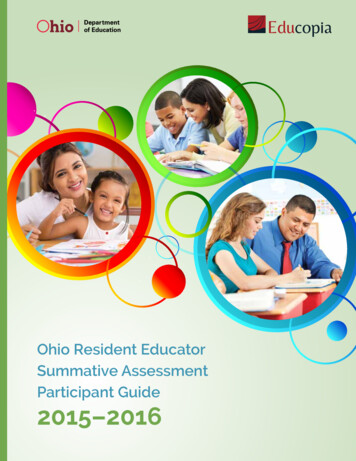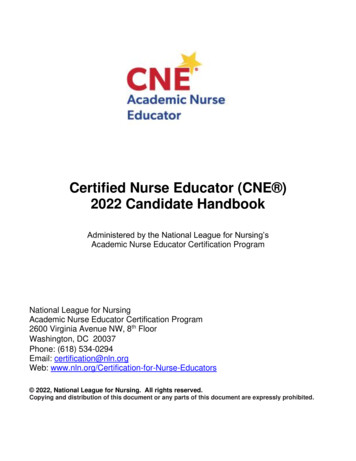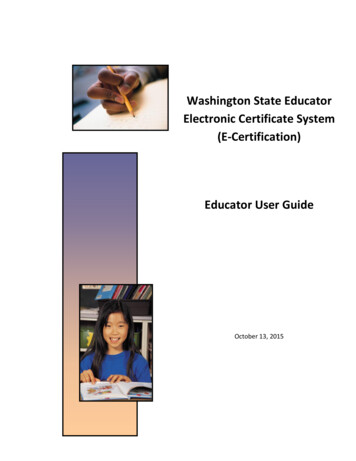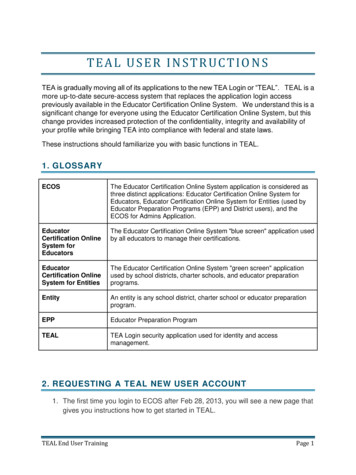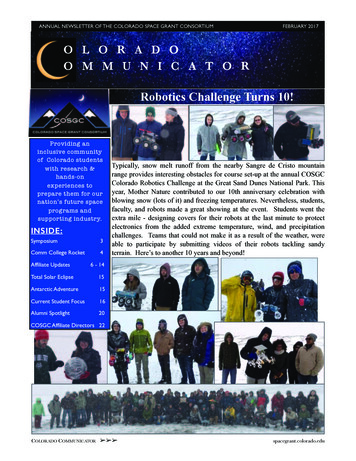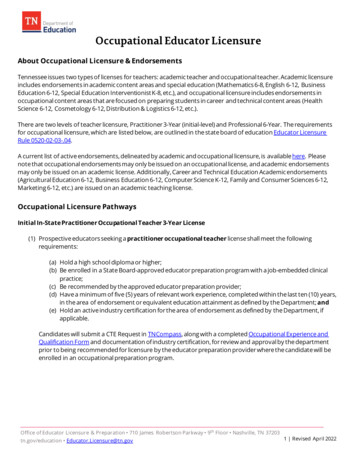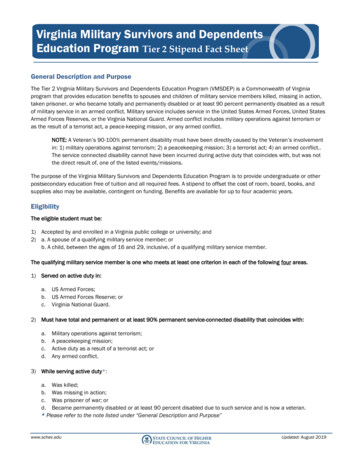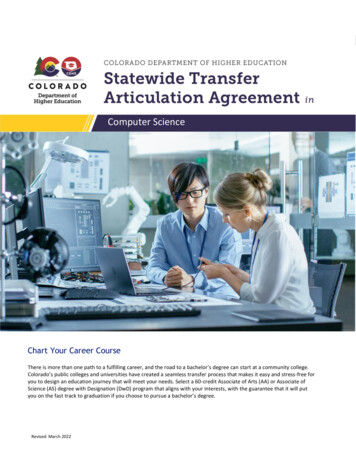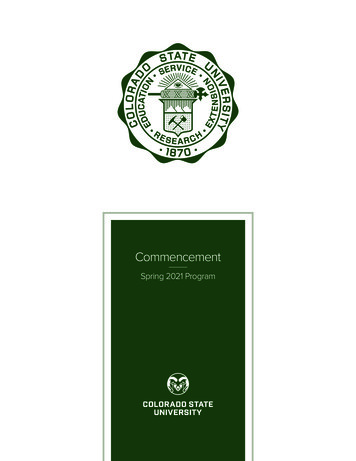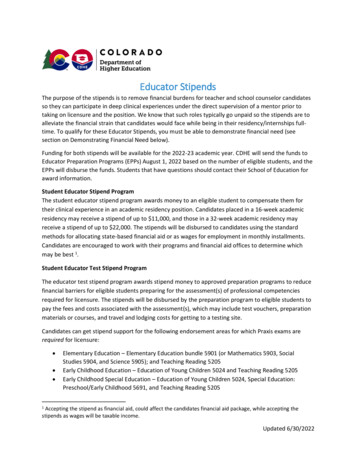
Transcription
Educator StipendsThe purpose of the stipends is to remove financial burdens for teacher and school counselor candidatesso they can participate in deep clinical experiences under the direct supervision of a mentor prior totaking on licensure and the position. We know that such roles typically go unpaid so the stipends are toalleviate the financial strain that candidates would face while being in their residency/internships fulltime. To qualify for these Educator Stipends, you must be able to demonstrate financial need (seesection on Demonstrating Financial Need below).Funding for both stipends will be available for the 2022-23 academic year. CDHE will send the funds toEducator Preparation Programs (EPPs) August 1, 2022 based on the number of eligible students, and theEPPs will disburse the funds. Students that have questions should contact their School of Education foraward information.Student Educator Stipend ProgramThe student educator stipend program awards money to an eligible student to compensate them fortheir clinical experience in an academic residency position. Candidates placed in a 16-week academicresidency may receive a stipend of up to 11,000, and those in a 32-week academic residency mayreceive a stipend of up to 22,000. The stipends will be disbursed to candidates using the standardmethods for allocating state-based financial aid or as wages for employment in monthly installments.Candidates are encouraged to work with their programs and financial aid offices to determine whichmay be best 1.Student Educator Test Stipend ProgramThe educator test stipend program awards stipend money to approved preparation programs to reducefinancial barriers for eligible students preparing for the assessment(s) of professional competenciesrequired for licensure. The stipends will be disbursed by the preparation program to eligible students topay the fees and costs associated with the assessment(s), which may include test vouchers, preparationmaterials or courses, and travel and lodging costs for getting to a testing site.Candidates can get stipend support for the following endorsement areas for which Praxis exams arerequired for licensure: Elementary Education – Elementary Education bundle 5901 (or Mathematics 5903, SocialStudies 5904, and Science 5905); and Teaching Reading 5205Early Childhood Education – Education of Young Children 5024 and Teaching Reading 5205Early Childhood Special Education – Education of Young Children 5024, Special Education:Preschool/Early Childhood 5691, and Teaching Reading 52051Accepting the stipend as financial aid, could affect the candidates financial aid package, while accepting thestipends as wages will be taxable income.Updated 6/30/2022
Special Education – Special Education: Core Knowledge and Applications 5354; ElementaryEducation bundle 5901 (or Mathematics 5903, Social Studies 5904, and Science 5905); andTeaching Reading 5205School Counselor – Professional School Counselor 5421Praxis exams that are required by the EPP, but not for licensure as listed above will not be covered.Educator Stipends Glossary:Academic Residency – a 16-week to 32–week intentional clinical experience for student educators whoare placed in a school- or community-based setting for their culminating clinical experience. The studentteacher/resident cannot be the teacher of record in the classroom.Approved Program of Preparation – An Educator Preparation Program (EPP) at a public, private orproprietary postsecondary institution authorized by the Colorado Commision of Higher Education tooffer educator preparation programs, or a designated agency authorized by the State Board ofEducation to offer educator preparation programs.CAFSA – Colorado Application for State Financial Aid (CAFSA) is used to determine the need for financialaid awarding purposes to students historically left out of receiving state and federal financial aid. NonU.S. citizens and those that are not permanent residents of the U.S. can use the CASFA to apply for aid.Students who are eligible for Federal Title IV aid by completing the FAFSA should not complete theCAFSA.Eligible student – a student who is enrolled in an approved program of preparation and eligible forfinancial assistance because the student's expected family contribution does not exceed 200% of themaximum federal Pell-eligible expected family contribution.FAFSA – The Free Application for Federal Student Aid (FAFSA) is used to demonstrate financial need.Use the FAFSA if you are a student educator enrolled in an approved preparation program and: are a U.S. citizen or an eligible noncitizen;o An eligible noncitizen is a U.S. national (includes natives of American Samoa or SwainsIsland), U.S. permanent resident (who has an I-151, I-551 or I-551C [Permanent ResidentCard]), or an individual who has an Arrival-Departure Record (I-94) from U.S. Citizenshipand Immigration Services (USCIS) showing one of the following designations: "Refugee" "Asylum Granted" "Cuban-Haitian Entrant (Status Pending)" "Conditional Entrant" (valid only if issued before April 1, 1980) Victims of human trafficking, T-visa (T-2, T-3, or T-4, etc.) holder "Parolee" (You must be paroled into the United States for at least one year andyou must be able to provide evidence from the USCIS that you are in the UnitedStates for other than a temporary purpose and that you intend to become a U.S.citizen or permanent resident.)Updated 6/30/2022
Expected Family Contribution (EFC) - an index number calculated to determine financial need accordingto a formula established by law used to how much financial aid you are eligible to receive.Student educator – a candidate in a preparation program for initial teacher or school counselorlicensure.Educator Stipend FAQs: Please check back as more Q&As become availableCan a school counseling student be serving as a teacher of record in a classroom if they are seeking aschool counseling degree? Also, can a school counseling student be serving as a school counselorunder an Intern Authorization or Temporary Educator Eligibility Authorization?In-service teachers (teachers of record) and those serving in paid school counselor roles under intern orTEE authorizations are not eligible. The purpose of the stipends is to provide funding for candidates sothat they can participate in deep clinical experiences under the direct supervision of mentors prior totaking on the role. We know that such roles go unpaid so the stipends are to alleviate the financialburdens that candidates would face while being in their internships full-time.When and how will student teachers receive their student educator stipends?EPPs must report their expected number of qualifying candidates to the Colorado Department of HigherEducation no later than July 1, 2022, with disbursement from the agency going directly to the IHEs byAugust 1, 2022. Preparation programs will distribute the stipends to students using their own standardmethods for allocating state-based financial aid to each eligible student in monthly installments.When and how will student teachers receive their testing funds?EPPs must report their expected number of qualifying candidates to the Colorado Department of HigherEducation no later than July 1, 2022, with disbursement from the agency going directly to the IHEs byAugust 1, 2022. EPPs will make arrangements to pay for the costs and fees associated with taking thePraxis exams required for licensure.What experiences/guidelines qualify one to receive one of these stipends?Eligible candidates must be enrolled in an educator preparation program, have a placement for studentteaching/academic residency in the upcoming academic year, and their expected family contributioncannot exceed 200% of the maximum federal limit to be eligible for PELL grants.What documentation does a candidate need to provide in order to take part in this program?In order to show that students meet the PELL financial eligibility guidelines to receive the stipends, theremust be a FAFSA (Free Application for Federal Student Aid) or CAFSA (Colorado Application for StateFinancial Aid) on file for each candidate.Do these stipends only apply to undergraduate students or can post-bacc students also apply?Yes, post-bacc and grad students seeking initial licensure may be eligible. Students should work withtheir financial aid office or see the steps below to see if there’s a way to show they meet the incomeeligibility requirement.Updated 6/30/2022
I see that Teacher of Record candidates are not eligible, but are candidates in alternative programs?Not typically because they are considered Teachers of Record, but there are a handful of alternativeprograms that do offer a residency alongside a mentor teacher before they become a Teacher ofRecord. As alternative teachers in that role, they would be eligible during that portion of their program.Are the Praxis test stipends retroactive or only for fees that will be paid in the future?Funding for stipends will begin for the 2022-23 academic yearWill the Temporary Educator Loan Forgiveness be available after this year?There will be additional rounds of this temporary program that will be available, but it will end when thefederal ARPA funding gets spent. That said, this other ELF program is ongoing as long as it continues tobe funded.Are alternative preparation programs included in the 22-1220 stipends?All Colorado approved preparation programs may have eligible students. Please note you will still haveto work with your financial aid office to determine how you will be able to demonstrate students meetthe financial eligibility requirements.Our ALT licensure program will have several likely eligible folks but since we are not housed in an IHE,I do not have access to a financial aid department to support me in determining eligibility. Can youprovide me with more info on how to determine eligibility or direct me to an individual who may beable to support me with this?Your students should still complete the FAFSA or CAFSA and have your students email them a copy of itwith the EFC summary on it. Please see EPPs determining financial need below.Who determines what counts as “fees and costs associated with the assessment?” For example,would it be up to the EPP to determine if certain courses or tutoring services is eligible to be covered?Covered expenses will largely be left up to the EPP. Check back for more information.Are practicum students (pre-student teaching) eligible if they are in placements that meet residencycriteria? Or is this only available for the final semester/year as a student teacher?Only candidates completing their clinical final experience (student teaching or residency) are eligible forthe student educator stipend. However, eligible students can receive test stipend support prior to thatclinical experience.How do EPPs report their numbers of eligible candidates to the state to receive funds?Please respond to the survey that was emailed to providers. If you need that link again, please emaileducator.preparation@dhe.state.co.us.What if providers need to make an adjustment to numbers reported July 1st?Please contact educator.preparation@dhe.state.co.usUpdated 6/30/2022
TBD: Some questions have yet to be determined in Colorado Commission onHigher Education (CCHE) policy or DHE guidance. Check back for moreinformation on the following:Who determines what counts as “fees and costs associated with the assessment?” For example,would it be up to the EPP to determine if certain courses or tutoring services is eligible to be covered?Are there a certain amount of hours a week that a candidate must be in the field with their mentorteacher in order to be eligible for the stipend?Is there a maximum amount of funds available per candidate for Praxis-related fees and costs?What tracking or reporting is required from EPPs as part of the stipend program? Are the template ormaterials to draw from?Demonstrating Financial NeedTo qualify for either the student educator stipend or the student educator test stipend you must meetcertain income eligibility requirements.Are you a United States citizen or an eligible noncitizen as described above?Yes you are eligible to complete the FAFSANo complete the CAFSAOnce you complete the FAFSA or CAFSA your EPP will determine your financial eligibility based on yourEFC. The information you report on your FAFSA or CAFSA is used to calculate your EFC. EFC is calculatedusing your family’s taxed and untaxed income, assets, and benefits. Also considered are your family sizeand the number of family members who will attend college or career school during the year.When you complete the FAFSA, you will list your college or university you want to receive yourinformation by entering your school’s Federal School Code. While completing the FAFSA form, you mustlist at least one school to receive your information. If your EPP is not listed, enter another CO publicinstitution or print your completed application and take it to your program director for them tocomplete the steps necessary to determine EFC. If you complete the FAFSA you will receive your EFC viaemail. You can also log in to view your Student Aid Report with the EFC summary on it and email a copyto your EPPIf you complete the CASFA, you will not receive your EFC via email. To view your EFC, log into thestudent portal and click the “View an application” icon (shaped like an eye) next to the application you’dlike to view; this will open a PDF of your completed application. Your calculated EFC is visible at thebottom of the application, just above the signature section.EPPs determining financial eligibilityTo demonstrate financial need, your students must complete a FAFSA or CAFSA. If you are an EPP at apublic or private college or university (even if an alt. Program) the financial aid office at your institutionUpdated 6/30/2022
should be able to tell you if candidates meet the eligibility criteria. If not, you should follow the stepsbelow.1. Using the information provided on the FAFSA or CAFSA forms, use the 2022-23 EFC FormulaGuide to calculate the candidate’s EFC. There are three regular formulas and a simplified versionof each (beginning on p. 2):a. Formula A, for dependent students;b. Formula B, for independent students without dependents other than a spouse; andc. Formula C, for independent students with dependents other than their spouse.2. The expected family contribution threshold for meeting Pell eligibility is 5,846. Per HB22-1220the expected family contribution cannot exceed 200% of the maximum federal Pell-eligibleexpected family contribution. Therefore, if the EFC calculated using the FAFSA, CAFSA, orformula information found above is 11,682 or less, the candidate meets the financial criteriafor eligibility.Updated 6/30/2022
School Counselor - Professional School Counselor 5421 Praxis exams that are required by the EPP, but not for licensure as listed above will not be covered. Educator Stipends Glossary: Academic Residency - a 16-week to 32-week intentional clinical experience for student educators who

